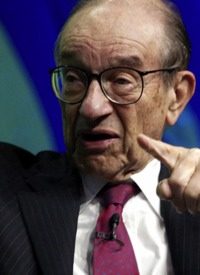
Alan Greenspan, former chairman of the Federal Reserve, is worried about many things. In March he worried about the future of the economy. “The important lesson,” he wrote, “is that bank regulators cannot fully or accurately forecast whether, for example, subprime mortgages will turn toxic…. A large fraction of such difficult forecasts will invariably be proved wrong…. Anticipating the onset of crisis … appears out of our forecasting reach.”
In June he worried about a revival of inflation.
Inflation is a special concern over the next decade given the pending avalanche of government debt about to be unloaded on world financial markets. The need to finance very large fiscal deficits during the coming years could lead to political pressures on central banks [like the Fed] to print money to buy much of the newly issued debt.
In September, he worried about the failure of the stimulus, the failed revival of the housing market, and continued high unemployment, but mostly he worried about the deficit. At a remarkable open-mike conference at the Council on Foreign Relations, Mortimer Zuckerman, editor in chief of U.S. News & World Report, opened the session with these words of concern: “We have had very, very aggressive government programs, both fiscal and monetary programs, and yet the response of the economy, two-and-a-half years into [the recession, benefits from those programs have] been quite limited. So, Alan, I would like to ask you — where do we go from here?”
Greenspan: “I’m not saying that the stimulus is not working, I’m just saying it’s working far less than anyone anticipate[d].”
Zuckerman: “There has been … an unbelievably limited response, in terms of housing, to the lowest interest rates — [this is] the first time that, when interest rates have gone down … housing sales have also gone down.”
Greenspan: “We’re getting housing starts for single-family dwellings down to unbelievable levels … barely the amount of demolitions…. Until we unload a very large amount of single-family homes … there’s no real solution to the recovery. It’s going to take a year or so to get rid of it.”
Zuckerman: “Well, even a year seems to be optimistic given the amount of supply."
Greenspan: “If prices can hold — and I’m not sure about that — … we’ll turn it around… But I’d like to raise another problem that disturbs me more than anything else. In 2005 and 2006, there [were] about 8 million homes purchased with so-called conventional … mortgages — you know, 20 percent down…. The home equity of that 20 percent down payment is now gone. So we’ve got a lot of conventionally financed homes … sitting right on the edge of going under water.”
Later in the conversation, Zuckerman addressed his concern about unemployment:
The fact is we’re looking at the highest levels of unemployment and partial unemployment that we’ve seen really since the end of World War II. And those numbers do not seem to be getting better.
Zuckerman: “How does the government respond to that?”
Greenspan: “We’d probably be better off by doing less than more. There is an implicit judgment on the part of most economists that in order to stimulate the economy you have to do something…. But I think there’s another choice here, which is – [it] basically gets to that old business of when you’re digging a hole, sometimes you stop digging. And my view here is that I think we’d be far better off to allow the normal market forces to operate here.”
Zuckerman: “What you are suggesting, if I understand it correctly, is to be very cautious about further fiscal stimulus? I don’t know why this brings to mind the definition of the bartender who is a ‘pharmacist with a limited inventory.’ [Laughter] I mean, we really — we really have very few options, in a sense, at this stage of the game, given what we’ve been through both in fiscal and monetary policy, and that impulse to do something, you’re suggesting, could be counterproductive?" [Emphasis added.]
Greenspan: “I think the deficit problem is a much more dangerous issue: I don’t think we have time to wait [to deal with that] … unless we come to grips with the deficit problem very quickly … we’re fooling ourselves about how much time we have.”
The former Fed chairman expanded on his concerns at a Bloomberg conference earlier this week, saying, “We’re involved in a dangerous game. We’re increasing the debt … at a pace that is closing the gap between our debt and any measure of borrowing capacity. That cushion is growing very narrow.”
In reviewing all the worries that Greenspan has, Gary North concluded that the powers that be also are worried — “from Ferguson, from Zuckerman, from Greenspan, from Peterson — nothing is working. The old Keynesian [economics] magic is not working. The economy is not recovering.”
It seems clear that all these worries reflect the fact that as deficits grow unchecked, America’s debt will be increasingly difficult to sell to foreigners, who will demand higher interest rates to offset the risk of default, which will raise interest rates, which will push the economy further underwater. And the establishment, including many who are directly responsible for pushing the country into this position, are finally beginning to feel the fear as well. It’s about time for the Country Class, as Dr. Angelo Codevilla calls it, to realize that the Ruling Class is out of options, and to make significant changes in who best represents their interests in November.
Photo of Alan Greenspan: AP Images



